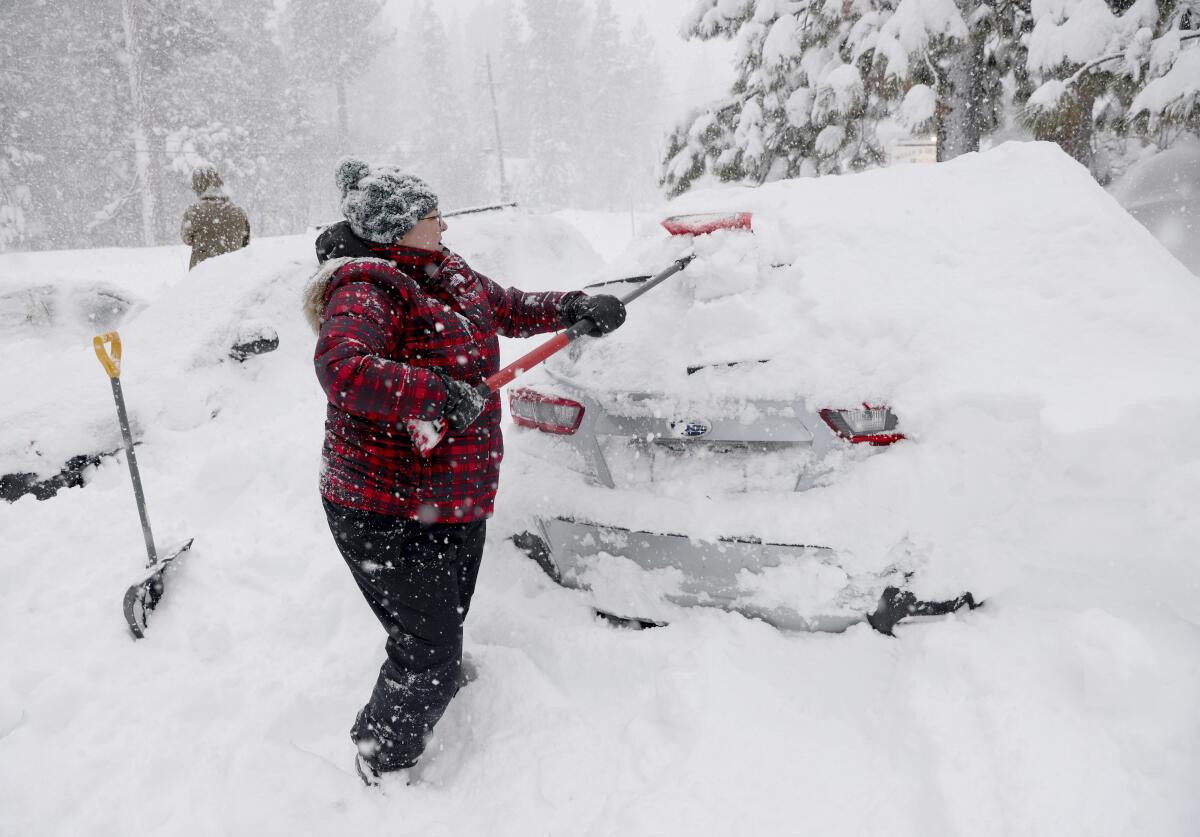
Good morning. It’s Monday, March 4. Here’s what you need to know to start your day.
Newsletter
Start your day right
Sign up for Essential California for news, features and recommendations from the L.A. Times and beyond in your inbox six days a week.
You may occasionally receive promotional content from the Los Angeles Times.
Readers shared their priorities for U.S. Senate candidates. We asked them to respond
Happy California Primary Eve to all who celebrate — especially those finally thumbing through those sample ballots, locating their mail-in ballots or looking up vote centers near their home or work.
Among the many choices Golden State voters will make by the end of Super Tuesday are the two candidates who will advance to the November election, when we choose our next full-term U.S. senator to represent California.
(There’s also a special vacancy election, which will decide who will finish out the term started by former Sen. Dianne Feinstein before her death in September.)
You may remember that in this newsletter we’re taking an intentional approach to covering this election and the general in November, with a “citizens agenda.” Which means, basically, less focus on the campaign as a horse race and more on the issues that voters (that’s you!) want to understand before taking part in the democratic process and choosing whom to put in positions of power.
Late last year, we asked you: What do you want the candidates to be talking about as they compete for votes?
Hundreds of Essential California readers responded, sharing their top concerns, telling us what they want candidates to prioritize in their campaigns, and gauging their satisfaction and participation in the democratic process. If you haven’t taken our survey yet, we hope you will — there’s plenty to explore between now and November.
Looking through the dozens of issues you mentioned, several common themes emerged. The most frequent by far were homelessness and housing, climate change, and healthcare.
So we took those issues to the candidates. We sent the front-runners — Democratic Reps. Adam Schiff, Barbara Lee and Katie Porter, and Republican Steve Garvey — questions with the goal of hearing from them directly. Those questions and their responses are below, edited for clarity and brevity.
One note: We did not hear back from Steve Garvey’s campaign, but his website presents several policy “visions,” including on homelessness, environmental stewardship and quality of life in California.
The most common issue our readers cited was meaningful solutions to California’s homelessness crisis. Many also mentioned a link to the ongoing housing crisis in the state. What would you do in your capacity as U.S. senator to tackle the root causes of the homelessness crisis in California?
Rep. Barbara Lee: Affordable housing is a human right. I will fight for housing that remains affordable in perpetuity, federal assistance for security deposits and down payments, a national rent control standard, a national eviction moratorium, and fully funded Section 8 rental assistance.
In the Senate, I will champion the Housing Crisis Response Act, to invest over $150 billion in fair and affordable housing, which would be the single largest investment in affordable housing in our nation’s history. I’ll also push the passage of the Ending Homelessness Act of 2023 to put $10 billion into permanent affordable housing.
I’ll also fight for comprehensive policies that uplift working families and low-income people, so Californians don’t have to choose between food and rent, and hold corporations accountable so we can sufficiently fund these priorities.
Rep. Katie Porter: I support permanent supportive housing that gets people off the streets, but we will never solve this crisis if we don’t also take steps to keep people from becoming homeless in the first place.
To do this, my Housing for All plan calls for fully funding Section 8 vouchers and down payment assistance that promotes homeownership. My 10-point plan also outlines federal policies that will help us build the nearly 1 million homes we need to solve California’s housing affordability challenges, including knocking down local barriers, unleashing private capital, and creating innovative leases for Americans with limited and fixed incomes.
I will focus on building the workforce and affordable housing Californians need, not giving Wall Street donors what they want to profit off our families’ shelter.
Rep. Adam Schiff did not provide a direct answer to this question. His campaign referred us to his housing affordability and homelessness agenda.
The threats of climate change are also a top concern among readers. California faces those threats on several fronts — including more extreme droughts, severe wildfires, stronger storms and flooding, and the worst air in the nation. As a U.S. senator, how would you respond to this crisis?
Rep. Katie Porter: I stand up to polluters and lead efforts to invest in our clean energy future. I wrote a new law that raises the fee we charge polluters to drill on our public lands for the first time in a century, and I successfully pressed the Biden administration to require Big Oil to pay more money up front before drilling, so taxpayers aren’t on the hook for cleanup after.
Clean energy has the potential to deliver thousands of good, high-paying jobs in construction, manufacturing, research, education and more. My Planet for Our Future plan calls for investments in clean energy and in efforts to protect workers and communities so that no one gets left behind as we push boldly toward clean energy and away from fossil fuels.
Rep. Barbara Lee: I will fight for low-income communities, communities of color, and Indigenous communities that bear the brunt of climate change’s worst effects, first by passing the A. Donald McEachin Environmental Justice for All Act.
I will implement legislation that builds on the Green New Deal principles, including the Green New Deal for Cities Act, to provide $1 trillion in federal funding for state and local governments to respond to the climate crisis.
I will continue holding the Pentagon accountable to meet emissions reduction targets, and address the danger climate effects pose in our national defense strategy. I will also hold fossil fuel corporations accountable, championing legislation to ban offshore drilling, raise taxes on corporate polluters’ fossil fuel income and wealth, and end new federal fossil fuel infrastructure permits.
Rep. Adam Schiff did not provide a direct answer to this question. His campaign referred us to his protecting our planet agenda.
Readers also wanted to hear from you on our healthcare system, which many called broken, inequitable and unaffordable. As senator, what’s the first thing you would do to address their concerns?
Rep. Adam Schiff: It kills me that there are so many Californians that don’t have access to good healthcare for their kids and their families. Our healthcare system is failing too many Californians. People are just one health emergency from bankruptcy. Meanwhile, health insurance companies are raking in record profits.
It’s why I’m proudly pushing to: pass Medicare for All; bring down prescription drug costs by allowing Medicare, not Big Pharma, to negotiate prices for all drugs; tackle the nursing shortage with increased training and salaries; and abolish the filibuster so that we can actually pass these reforms.
I would also work to pass my bill, the Equal Health Care for All Act, which would make equal access to healthcare a protected civil right.
Rep. Barbara Lee: I’ve co-sponsored every piece of Medicare for All legislation since 2003, and I’m the only candidate in this race in the House’s Medicare for All caucus.
In the Senate, on Day 1, I will establish a sister caucus to focus on delivering the affordable, accessible healthcare — medical, mental and reproductive — that Americans deserve. The caucus will also lead immediate efforts to advocate for expanded access to healthcare in broader legislation — like the efforts I led to implement a single-payer option in the Affordable Care Act.
I will introduce legislation that will build on the [Inflation Reduction Act]’s success and exist past its expiration, including lowered prescription drug costs.
Finally, I will fight to codify the right to an abortion into law. Reproductive care is healthcare.
Rep. Katie Porter: A Medicare for All system will deliver the highest-quality care with the most choice and lowest cost. For too long, career politicians have stood by while corporate special interests write our health policy, which has allowed Big Insurance to restrict us with networks and Big Pharma to price-gouge us year after year.
I’ve forcefully advocated for Medicare for All, including showing in a hearing how it would save money on administrative costs. I’ve written new laws holding insurance companies accountable for failing to cover mental health services and cracking down on Big Pharma hiking drug prices faster than the rate of inflation. As the only elected official in this race who has never taken money from corporate PACs or Big Pharma executives, I’ll continue to push for reforms, including expanding the list of drugs Medicare can negotiate, closing coverage gaps, and more.
Still weighing your options before finalizing your ballot? There’s still time to explore The Times’ voter guides for information and context on dozens of races before the polls close tomorrow.
Today’s top stories

Janna Gunnels digs out her car on North Lake Boulevard as snow falls in Tahoe City, Calif., on Saturday.
(Jane Tyska / Bay Area News Group)
Winter storms
Climate and environment
Elections
More big stories
Get unlimited access to the Los Angeles Times. Subscribe here.
Today’s great reads

(Andrew Rea / For The Times)
Quiet quitting. RTO. Coffee badging. What this new vocabulary says about your workplace. Work-related buzzwords aren’t just for social media — they’re increasingly common IRL. The Times’ Samantha Masunaga and Sean Greene examined what this new vocabulary says about workers and their environments. They write: “It’s a viral language showing how workers are trying to hold on to the power they suddenly gained during the pandemic, workplace experts say.”
How can we make this newsletter more useful? Send comments to essentialcalifornia@latimes.com.
For your downtime

101 Noodle Express in Alhambra is known for its beef roll. The restaurant also has a location in Arcadia that serves the same roll.
(Jenn Harris / Los Angeles Times)
Going out
Staying in
And finally … a great photo
Show us your favorite place in California! We’re running low on submissions. Send us photos that scream California and we may feature them in an edition of Essential California.

(Brian van der Brug / Los Angeles Times)
Today’s great photo is from Times photographer Brian van der Brug. Tony Tucci, chair and co-founder of CLAW, Citizens for Los Angeles Wildlife, walks out of a cast concrete cave on a Laurel Canyon property. Tucci is one of the conservationists hoping to purchase the spring-fed woodsy hollow, which features mysterious man-made caverns and serves as a key wildlife passageway through the heart of the Hollywood Hills.
Have a great day, from the Essential California team
Ryan Fonseca, reporter
Amy Hubbard, deputy editor, Fast Break
Check our top stories, topics and the latest articles on latimes.com.